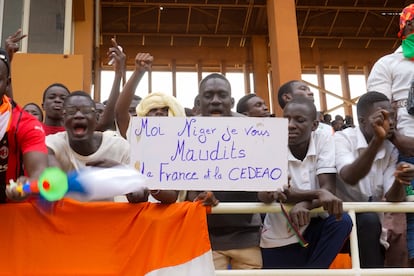Niger, between a rock and a hard place
If there is no military intervention and sanctions are not applied, the coup leaders will understand that they have a free hand

The situation in Niger, both in terms of welfare and security, was far from encouraging before the military uprising led by General Abdourahamane Tchiani on July 26. But now, while the Economic Community of West African States (Ecowas) is hesitating to carry out its ultimatum of military intervention in the country to reinstate President Mohamed Bazoum, all realistic options for Niger lead to the same point, and none of them are good.
Should intervention materialize, it would exponentially increase the prospect of a regional war of incalculable consequences. The coup plotters have already made clear their intention to cling to power by any means necessary. They have a limited Armed Forces — the number of troops at their disposal is estimated at between the 12,000 usually reported by the primary international sources and the 40,000 that Bazoum himself cited a few months ago — incapable of guaranteeing the security of a country of 1.2 million square kilometers and 5,500 kilometers of borders. And although there are signs of internal discord between the Presidential Guard, headed by Tchiani, and other high-ranking military commanders, for the moment it does not seem that any of them is willing to challenge his power.
In any case, they have given unequivocable signs that they are prepared to resort to all imaginable methods to resist a hypothetical onslaught. Among these — in addition to seeking the collaboration of the Tuaregs living in the northern part of the country — is to request the help of neighbors where military juntas are in power, such as Burkina Faso, Chad, Guinea, or Mali, who have already shown their willingness to align themselves with the new Nigerian authorities. None of these countries possess vast military power, but they constitute a reinforcement whose destabilizing potential cannot be underestimated if violence breaks out. The same can be said of the foreseeable involvement of the Wagner mercenary group, spearhead of the Russian strategy to gain influence in the Sahel by taking advantage of the mistakes made by France and the United States.
Facing them is a force made up of several members of Ecowas, with Nigeria at the head, backed by Benin, Ivory Coast, and Senegal. The military potential of this bloc — taking into account that Nigeria has few idle units to be incorporated into a possible regional coalition — does not indicate that in an uncertain armed confrontation it could achieve an immediate and definitive victory. Such a scenario would only be feasible with Western support; an even more worrying option, given the growing anti-French and anti-Western sentiment in the country and the region.
From the military point of view, if an intervention were to take place, it would most likely combine a direct action to take control of Niamey in an attempt to force the reinstatement of Bazoum, with incursions into Nigerien territory from several directions, forcing the coup plotters to maintain a wide deployment to close the avenues of advance and leaving them with fewer forces to defend their position in Niamey.
But if a regional intervention fails to materialize, the resulting scenario is by no means better. On the one hand, it would mean validating a new coup d’état, distancing the Sahel from governments legitimized at the ballot box, with rulers more concerned with consolidating their privileges than providing for their fellow citizens. On the other, in light of the first decisions taken by Tchiani, it would open the door for renewed Russian influence in the region, hand in hand with a mercenary group that is not exactly distinguished by its respect for human rights and international humanitarian law.
However many mistakes have been made by Paris, Washington and Brussels — relying on the support of highly questioned rulers, as long as they conform to the dictates of their Western patrons — there is nothing to suggest that the situation will improve under Moscow’s hand, either in terms of welfare (around 90% of the 27 million inhabitants of Niger live below the poverty line), or in terms of security. Precisely in the latter sphere, even if Ecowas does not intervene, the coup leaders are redeploying their forces to consolidate control of the capital, which immediately translates into a reduced capacity to face the threat posed by Al Qaeda-linked jihadist groups such as Support Group for Islam and Muslims (JNIM) and Islamic State in the Greater Sahara.
History has repeatedly shown that appeasement does not work. If there is no military intervention and no sanctions are applied — 70% of the electricity consumed by Niger comes from Nigeria, through whose territory it carries out the bulk of its foreign trade — the coup plotters will understand that they have a free hand. And so will those who dream of imitating them.
Sign up for our weekly newsletter to get more English-language news coverage from EL PAÍS USA Edition
Tu suscripción se está usando en otro dispositivo
¿Quieres añadir otro usuario a tu suscripción?
Si continúas leyendo en este dispositivo, no se podrá leer en el otro.
FlechaTu suscripción se está usando en otro dispositivo y solo puedes acceder a EL PAÍS desde un dispositivo a la vez.
Si quieres compartir tu cuenta, cambia tu suscripción a la modalidad Premium, así podrás añadir otro usuario. Cada uno accederá con su propia cuenta de email, lo que os permitirá personalizar vuestra experiencia en EL PAÍS.
¿Tienes una suscripción de empresa? Accede aquí para contratar más cuentas.
En el caso de no saber quién está usando tu cuenta, te recomendamos cambiar tu contraseña aquí.
Si decides continuar compartiendo tu cuenta, este mensaje se mostrará en tu dispositivo y en el de la otra persona que está usando tu cuenta de forma indefinida, afectando a tu experiencia de lectura. Puedes consultar aquí los términos y condiciones de la suscripción digital.








































